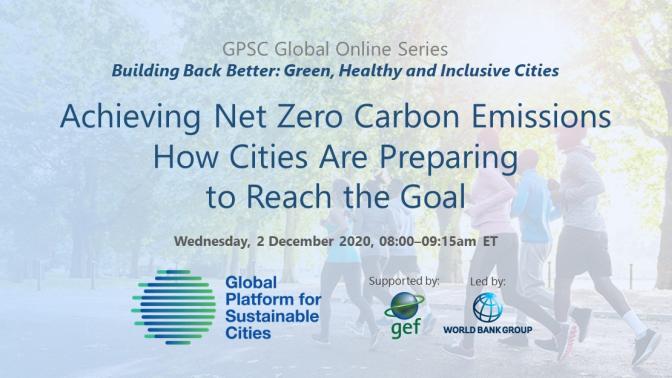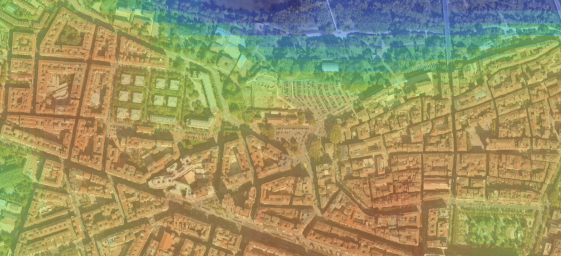The Global Platform for Sustainable Cities (GPSC) is organizing a weekly online series focusing on how cities can leverage the COVID-19 pandemic’s unprecedented disruption to facilitate a green recovery and improve their long-term urban sustainability.
To limit global warming to 1.5 degrees Celsius, reaching net zero emissions or carbon neutrality is essential. The EU has committed to carbon neutrality by 2050; China recently pledged to be carbon neutral by 2060. These goals require radical and transformational changes of their existing systems. More than 80% of global GDP is generated in cities; but cities also account for more than 70% of global greenhouse gas emissions. To reach their targets, cities must lead the way in the transition to a climate neutral economy. This session explores how Helsinki and Paris plan to go carbon neutral by 2035 and 2050, respectively; and the opportunities and challenges for Chinese and American cities in making the low carbon transition.
Opening Remarks
Bernice K. Van Bronkhorst, Global Director, Climate Change, Sustainable Development Global Practice, World Bank
Presentations
Discussion
Zou Ji, President of China Energy Foundation
Rushad Nanavatty, Senior Principal, Rocky Mountain Institute
Xueman Wang, Senior Urban Specialist, World Bank
Bios
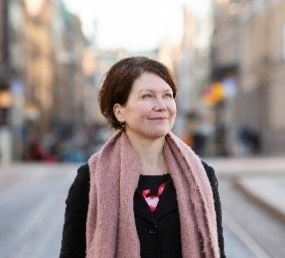 Kaisa-Reeta Koskinen works as a Project Director for Carbon Neutral Helsinki Programme for City of Helsinki. She is specialized in energy efficiency and energy management and has almost 20 years of energy and environmental policy experience in the industrial, NGO and government sectors. She received a master’s degree in Physics and is also a Qualified Specialist in both Management and in Sustainability and Environmental Technology.
Kaisa-Reeta Koskinen works as a Project Director for Carbon Neutral Helsinki Programme for City of Helsinki. She is specialized in energy efficiency and energy management and has almost 20 years of energy and environmental policy experience in the industrial, NGO and government sectors. She received a master’s degree in Physics and is also a Qualified Specialist in both Management and in Sustainability and Environmental Technology.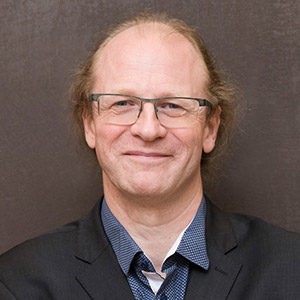 Yann Francoise, Head of Climate at the Energy and Circular Economy Strategies, for the Urban Ecology Agency for the City of Paris. He is responsible for the energy strategy, the fight against climate change and the circular economy of the City of Paris. An engineer in urban engineering by training, he has become over time a specialist in energy issues and the fight against climate change in major cities. Since the launch of the City of Paris Climate Energy Plan in 2005, he has been involved in its implementation and development with the objective of carbon neutrality in 2050.
Yann Francoise, Head of Climate at the Energy and Circular Economy Strategies, for the Urban Ecology Agency for the City of Paris. He is responsible for the energy strategy, the fight against climate change and the circular economy of the City of Paris. An engineer in urban engineering by training, he has become over time a specialist in energy issues and the fight against climate change in major cities. Since the launch of the City of Paris Climate Energy Plan in 2005, he has been involved in its implementation and development with the objective of carbon neutrality in 2050.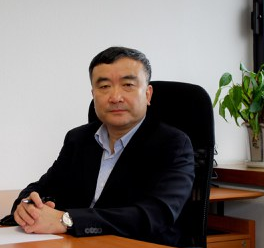 Zou Ji, President of China Energy Foundation. He has years of experience in economics, energy, environment, climate change, and policymaking. He is highly regarded in the climate and clean energy space. He previously served as a deputy director general of China’s National Center for Climate Change Strategy and International Cooperation, under the government’s National Development and Reform Commission, focusing on China’s low-carbon development strategy and policy, and led international climate negotiations and collaboration.
Zou Ji, President of China Energy Foundation. He has years of experience in economics, energy, environment, climate change, and policymaking. He is highly regarded in the climate and clean energy space. He previously served as a deputy director general of China’s National Center for Climate Change Strategy and International Cooperation, under the government’s National Development and Reform Commission, focusing on China’s low-carbon development strategy and policy, and led international climate negotiations and collaboration.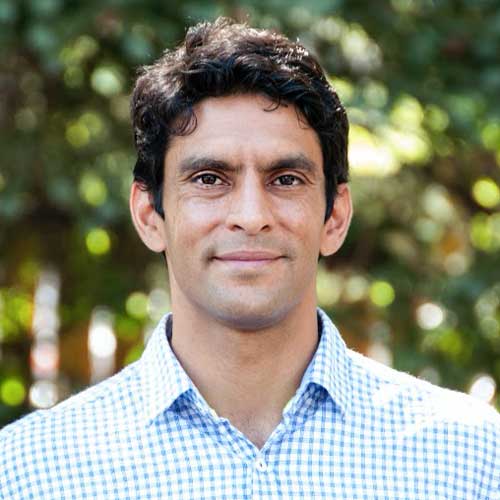 Rushad Nanavatty, Senior Principal, Rocky Mountain Institute. He leads Rocky Mountain Institute’s urban transformation work, currently focused on helping U.S. cities achieve their climate, sustainability, and clean energy goals. Rushad established the City Renewables Accelerator, an initiative of the American Cities Climate Challenge providing over 100 U.S. cities with technical assistance related to decarbonizing their electricity systems. Rushad has a master’s degree in International Relations and International Economics from the School of Advanced International Studies (SAIS) at Johns Hopkins University, and a bachelor’s degree in Economics and Philosophy from St. Stephens College at the University of Delhi.
Rushad Nanavatty, Senior Principal, Rocky Mountain Institute. He leads Rocky Mountain Institute’s urban transformation work, currently focused on helping U.S. cities achieve their climate, sustainability, and clean energy goals. Rushad established the City Renewables Accelerator, an initiative of the American Cities Climate Challenge providing over 100 U.S. cities with technical assistance related to decarbonizing their electricity systems. Rushad has a master’s degree in International Relations and International Economics from the School of Advanced International Studies (SAIS) at Johns Hopkins University, and a bachelor’s degree in Economics and Philosophy from St. Stephens College at the University of Delhi. Xueman Wang, Senior Urban Specialist, World Bank. She leads World Bank’s Global Platform for Sustainable Cities (GPSC) and undertakes urban infrastructure lending programs in East Asia. She was a team leader for the World Bank’s Partnership for Market Readiness – a global program for supporting countries to prepare and implement carbon pricing. She was part of the core team for the World Bank flagship report 2010 World Development Report – “Development and Climate Change” and has recently led the reports such as “Urban Sustainability Framework”, “Chongqing 2035: Economic and Spatial Transformation for a Global City” and “Natural Asset and Biodiversity Valuation in Cities”.
Xueman Wang, Senior Urban Specialist, World Bank. She leads World Bank’s Global Platform for Sustainable Cities (GPSC) and undertakes urban infrastructure lending programs in East Asia. She was a team leader for the World Bank’s Partnership for Market Readiness – a global program for supporting countries to prepare and implement carbon pricing. She was part of the core team for the World Bank flagship report 2010 World Development Report – “Development and Climate Change” and has recently led the reports such as “Urban Sustainability Framework”, “Chongqing 2035: Economic and Spatial Transformation for a Global City” and “Natural Asset and Biodiversity Valuation in Cities”. 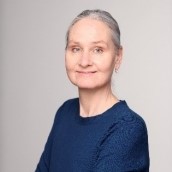 Bernice K. Van Bronkhorst, Global Director for Climate Change, Sustainable Development Global Practice, World Bank. She has since held various positions, including as Sector/Practice Manager from 2012-2016 for the Disaster Risk Management and Climate Change unit in the South Asia Region and, most recently, as Practice Manager for Urban Development and Disaster Risk Management for East and Southern Africa in the Social, Urban, Rural and Resilience GP. At present Global Director, Climate Change, she oversees the key strategic priorities and implementation of the Climate Change Action Plan, working closely with Climate Change Management team and staff, other Global Practices, and internal and external clients.
Bernice K. Van Bronkhorst, Global Director for Climate Change, Sustainable Development Global Practice, World Bank. She has since held various positions, including as Sector/Practice Manager from 2012-2016 for the Disaster Risk Management and Climate Change unit in the South Asia Region and, most recently, as Practice Manager for Urban Development and Disaster Risk Management for East and Southern Africa in the Social, Urban, Rural and Resilience GP. At present Global Director, Climate Change, she oversees the key strategic priorities and implementation of the Climate Change Action Plan, working closely with Climate Change Management team and staff, other Global Practices, and internal and external clients.


